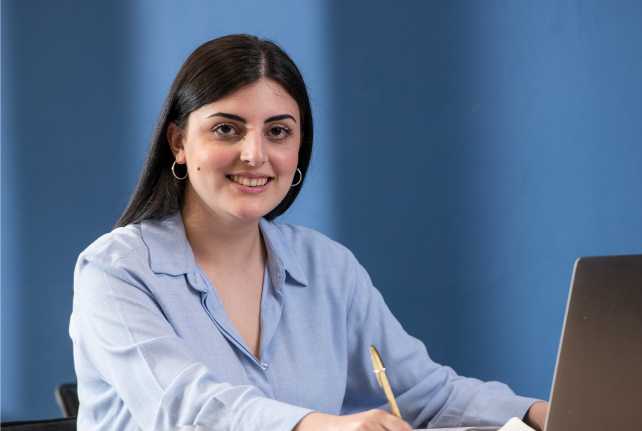PROGRAM DETAILS
Duration18 months without practicum (full time) or 24 months with practicum (full time)
Fees
€6,075 for 90 ECTS or €7,425 for 110 ECTS
LanguageGreek
CampusN/A
Upon program completion, students are expected to be able to understand and critically reflect on a broad spectrum of subjects relating to special and inclusive education.
More specifically, students are expected to:
1. Familiarize themselves with issues, theoretical approaches and definitions relating to special and inclusive education, e.g., different models of understanding disability, the historical evolution of the field of special education, as well as educational issues, such as inclusive education, and differentiation in teaching and learning.
2. Understand the theoretical models of special and inclusive education and be able to critically analyze the various methods and psycho-pedagogical techniques used in the classroom to promote effective and successful learning for all students.
3. Understand the basic principles underlying human development in key areas during infancy, early childhood, schooling and adolescence. In addition, understand the interaction between genetic and environmental factors during development.
4. Explain possible deviations from the typical course of development; understand the main issues of psychopathology of the child.
5. Understand and perform successful assessment methods, in order to identify different types of disabilities and/ or SEN.
6. Describe and effectively apply ways, in which they can support students in an inclusive school environment.
7. Have an excellent knowledge of the types of SEN, including knowledge of causes and factors related to each disability and/ or SEN etc., of the diagnostic criteria, with an emphasis on the impact of SEN in students’ behavior and learning profiles.
8. Understand basic methods of planning, conducting and discussing research and, in particular, educational research on Special Education.
9. Be able to design qualitative and/or quantitative research on issues related to special and inclusive education.
The graduates of the program possess all the necessary knowledge and skills required for the design and delivery of effective instruction to address different student profiles.
Additionally, graduates holding the MEd in Special Education could be employed as Special Educators in public and private schools (depending on their first degree) hence increasing their employability opportunities.
Subsequently, graduates of the program can work as educators at all levels of public and private education (depending on their first degree) or be employed in other public services, in organization/institutions that offer educational programs, semi-government organizations and private enterprises.
Moreover, they can pursue further postgraduate studies at doctoral level.
Admission process
The admission requirements are specified in the General Student Regulations as well as in the Frederick University Studies Regulation.
An undergraduate degree from a recognized university or the equivalent international qualification or an acceptable professional qualification is considered the main academic requirement.
Additionally, very good knowledge of Greek and English is extremely important. The advantage is considered the demonstration of satisfactory knowledge of the English language (suitable qualifications may include TOEFL, IELTS, GCSE, IGCSE, and Cambridge Certificate of Proficiency in English or equivalent).
Prospective students are expected to submit their application and all related documents, such as copies of their degrees, transcripts, one letter of recommendation of professors or supervisors in the workplace, a name/surname and contact information of professors or supervisors in the workplace that may be asked to provide a recommendation, and a research interest report. Where the Program Committee deems it necessary, the candidates may be asked for an interview meeting.
By the expiry of the application deadline for admission to the program, the Evaluation Program Committee will evaluate prospective students based on specific criteria, such as academic records, recommendation letters, digital literacy, research interests, interview, work experience, knowledge of Greek and/or English, etc. The committee decisions are announced by electronic mail or otherwise to all candidates.
General Criteria for Distance Learning
General Criteria for Distance Learning
All Distance Learning Programmes are offered using E-Learning methods. Therefore, students applying to enter DL Programmes, additionally to the academic requirements of each program, must have a good level of digital literacy:
The list of prerequisite digital literacy and equipment that the student should have available in order to participate and be an active member of the program include:
1. Access to reliable broadband internet
2. Computer with camera and microphone capacity
3. Smartphone
4. Ability to send and receive emails and files
5. Ability to operate within a web digital environment such as the learning platform
6. Ability to manage word processing, presentation, and other basic office application functions.
i. The performance of students is judged through a wide range of assessment modalities such as exams, written work, e-portfolios, presentations, etc. The course grading will be based on the official scale (0-100). Students failing in one course (under grade 50) will be given a second chance for examination without repeating the course. If fail second time, in case of electives, they can choose another course.
ii. The Master’s thesis can only be undertaken when all necessary compulsory courses have been successfully completed.
Graduation Requirements
Students complete the program and obtain a Master in Special Education after successfully completing 90 ECTS (or 110 ECTS with an internship) as shown by the structure of the program. The graduation of the student assumes that the total weighted average of the student's score is greater than 5.00 / 10.00.
In cases where the total weighted average of the student's score is less than 5.00 / 10.00, the student must enroll and successfully complete additional courses or repeat his / her studies in certain courses to improve the overall weighted average grade.
Access to Further Studies
The graduates of the Program have access to doctoral programmes (3rd Cycle) in relevant disciplines.
Module Group
ECTS
The student must successfully complete 50 ECTS, from the following list of modules:
The student must successfully complete 40 ECTS, from the following list of modules:
| No. | Code | Name | ECTS | Hours / week |
|---|---|---|---|---|
| 1 | DLSPEN506 | SENSORY DISABILITIES | 10 | 3 |
| 2 | DLSPEN507 | LEARNING DIFFICULTIES AND BEHAVIOURAL PROBLEMS | 10 | 3 |
| 3 | DLSPEN508 | CURRENT TRENDS IN SPECIAL AND INCLUSIVE EDUCATION | 10 | 3 |
| 4 | DLSPEN509 | INTERCULTURAL PRACTICES AND INCLUSIVE EDUCATION | 10 | 3 |
| 5 | DLSPEN510 | MUSIC IN SPECIAL EDUCATION | 10 | 3 |
| 6 | DLSPEN511 | ART AS A THERAPEUTIC TOOL IN SPECIAL EDUCATION | 10 | 3 |
| 7 | DLSPEN512 | DEVELOPMENTAL PSYCHOLOGY | 10 | 3 |
| 8 | DLSPEN513 | CHILD WITH SPECIAL NEEDS, ADULT WITH SPECIAL NEEDS: FROM SCHOOL TO SOCIETY | 10 | 3 |
| 9 | DLSPEN514A | POSTGRADUATE DISSERTATION I | 10 | 3 |
| 10 | DLSPEN514B | POSTGRADUATE DISSERTATION ΙΙ | 20 | 3 |
The student must successfully complete 20 ECTS, from the following list of modules:
| No. | Code | Name | ECTS | Hours / week |
|---|---|---|---|---|
| 1 | DLSPEN515A | PRACTICUM I | 10 | 3 |
| 2 | DLSPEN515B | PRACTICUM II | 10 | 3 |
Total
90
Semesters
ECTS
| No. | Code | Name | ECTS |
|---|---|---|---|
| 1 | DLSPEN501 | SPECIAL AND INCLUSIVE EDUCATION | 10 |
| 2 | DLSPEN502 | STUDENTS WITH SPECIAL EDUCATIONAL NEEDS | 10 |
| 3 | DLSPEN503 | RESEARCH METHODOLOGY | 10 |
| TOTAL | 30 |
| No. | Code | Name | ECTS |
|---|---|---|---|
| 1 | DLSPEN504 | TEACHING STRATEGIES IN SPECIAL AND INCLUSIVE EDUCATION | 10 |
| 2 | DLSPEN505 | EVALUATION IN SPECIAL EDUCATION | 10 |
| 3 | SPECIAL EDUCATION ELECTIVE | 10 | |
| TOTAL | 30 |
| No. | Code | Name | ECTS |
|---|---|---|---|
| 1 | SPECIAL EDUCATION ELECTIVE | 10 | |
| 2 | SPECIAL EDUCATION ELECTIVE | 10 | |
| 3 | SPECIAL EDUCATION ELECTIVE | 10 | |
| TOTAL | 30 |
| No. | Code | Name | ECTS |
|---|---|---|---|
| 1 | DLSPEN515A | PRACTICUM I | 10 |
| 2 | DLSPEN515B | PRACTICUM II | 10 |
| TOTAL | 30 |
The delivery of the program of study is supported by the following members of staff:
| Rank | Name |
|---|---|
| Professor | Prof. Areti Panaoura |
| Associate Professor | Dr. Nataly Loizidou Ieridou |
| Associate Professor | Dr. Stavros Parlalis |
| Associate Professor | Dr. Maria Vasiliadou |
| Assistant Professor - Programme Coordinator | Dr. Olga Lyra |
| Assistant Professor | Dr. Chrysa Nitsiou |
| Lecturer | Dr. Foteini Economidou Kranou |
| Lecturer | Dr. Louiza Ioannidou |
| Visiting Professor/Collaborating Acad. Staff | Dr. Anastasia Alevriadou |
| Visiting Professor/Collaborating Acad. Staff | Dr. Chrysoula Maggafa |
| Visiting Lecturer | Dr. Georgia Maki Panaoura |
| Visiting Lecturer/Collaborating Acad. Staff | Dr. Giorgina Athanasiou |
| Collaborating Acad. Staff | Dr. Sofia Anastasiadou |
| Collaborating Acad. Staff | Dr. Agathi Argyriadi |
| Collaborating Acad. Staff | Dr. Maria Athanasekou |
| Collaborating Acad. Staff | Dr. Pinelopi Alexia Avagianou |
| Collaborating Acad. Staff | Dr. Evgenios Avgerinos |
| Collaborating Acad. Staff | Dr. Charalambos Avgousti |
| Collaborating Acad. Staff | Dr. Georgios Botsas |
| Collaborating Acad. Staff | Dr. Stella Danou |
| Collaborating Acad. Staff | Dr. Ioanna Dimitriadou |
| Collaborating Acad. Staff | Dr. Maria Dimitropoulou |
| Collaborating Acad. Staff | Dr. Maria Efstratopoulou |
| Collaborating Acad. Staff | Dr. Maria Georgiadi |
| Collaborating Acad. Staff | Dr. Sophia Giazitzidou |
| Collaborating Acad. Staff | Dr. Georgia Iatraki |
| Collaborating Acad. Staff | Dr. Theodoros Kastanias |
| Collaborating Acad. Staff | Dr. Dimitra Katsarou |
| Collaborating Acad. Staff | Dr. Stefanos Koutras |
| Collaborating Acad. Staff | Dr. Tryfon Mavropalias |
| Collaborating Acad. Staff | Dr. Andrianos Moutavelis |
| Collaborating Acad. Staff | Dr. Kallistheni Neocleous |
| Collaborating Acad. Staff | Dr. Sousanna-Maria Nikolaou |
| Collaborating Acad. Staff | Dr. Ioannis Noulis |
| Collaborating Acad. Staff | Dr. Konstantinos Mi Ntinas |
| Collaborating Acad. Staff | Dr. Theodora Papazoglou |
| Collaborating Acad. Staff | Dr. Apostolia Pastra |
| Collaborating Acad. Staff | Dr. Stefanos Plexousakis |
| Collaborating Acad. Staff | Dr. Vasiliki Pliogkou |
| Collaborating Acad. Staff | Dr. Stavroula Polychronopoulou Zac |
| Collaborating Acad. Staff | Dr. Agoritsa Psyllou |
| Collaborating Acad. Staff | Dr. Eleni Rachanioti |
| Collaborating Acad. Staff | Dr. Elli Samara |
| Collaborating Acad. Staff | Dr. Eleni Samsari |
| Collaborating Acad. Staff | Dr. Lambrini Seremeti |
| Collaborating Acad. Staff | Dr. Spyridon Soulis Georgios |
| Collaborating Acad. Staff | Dr. Aikaterini Sousamidou |
| Collaborating Acad. Staff | Dr. Nayia Stylianidou |
| Collaborating Acad. Staff | Dr. Stylianos Stylianou |
| Collaborating Acad. Staff | Dr. Antigoni Stylianou Parpunas |
| Collaborating Acad. Staff | Dr. Dimitra Tombrou |
| Collaborating Acad. Staff | Dr. Ilias Vasileiadis |
| Collaborating Acad. Staff | Ms. Korina Vasileiou |
| Collaborating Acad. Staff | Dr. Maria N (OLD) Zafiropoulou |









